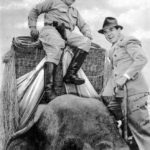Weekly Wrap Volume 160
Some refer to the rock-like substance as “floating gold” because of its hue and value. (For reference, 175 pound, 79 kg, lump of it was recently found floating off the coast of Qurayat, netting the fishermen who found it a cool $3 million when they sold it at auction.) Others call it “ambergris,” derived from the Old French “ambre gris,” meaning “grey amber.” But perhaps the most accurate way to describe the prized, rare, hard lumpy substance found floating in oceans and washed up on beaches worldwide is excrement- whale excrement, to be exact. Ambergris is a strong smelling, waxy-feeling, whale emission that’s been used for centuries by humans in…(more)
 Can the Queens Guards Really Not React to People When on Duty?
Can the Queens Guards Really Not React to People When on Duty?
“The Queen’s Guard” comprise of various soldiers tasked with guarding the residences of the Queen and, by extension, the Queen herself. Consisting of soldiers (mostly) hand picked from five elite regiments within the British military, the Queen’s Guard are internationally renowned for their stoic dedication to duty. However, contrary to popular belief, these soldiers are permitted to move (and do so regularly, even when just on guard duty and not on parade) and in certain circumstances do react to hecklers or the like. That said, while on duty outside one of the Queen’s…(more)
 In Which We Discuss a Variety of Fascinating Eclipse Related Facts for Your Reading Pleasure
In Which We Discuss a Variety of Fascinating Eclipse Related Facts for Your Reading Pleasure
After initially welcoming Christopher Columbus and his crew to Jamaica and supplying them with food and supplies after he became shipwrecked in 1503, the Arawak Indians grew weary of Columbus’ men robbing and cheating them and subsequently halted all trade with their island guests. Without a significant source of food or means to leave, Columbus’ expedition was in serious trouble. Luckily for his crew, he had certain astronomical tables with him, including the Ephemeris compiled by the German astronomer Johannes Müller von Königsberg, better known today by his Latin name, Regiomontanus. In this almanac, Regiomontanus predicted there…(more)
This Week’s YouTube Videos (Click to Subscribe)
- Mozart’s Much Less Family Friendly Works
- That Time a Teen Funded His College Education by Asking People for Pennies
- The Trials and Tribulations of 1904 Olympic Marathon Runners
- The Mysterious Black Goo of Venezuela – La Mancha Negra
- How Did the “Slipping on a Banana Peel” Comedy Gag Start?
- Why Fruits Change Color and Flavor as They Ripen
- WWII Files – Pigeon Guided Missiles and Literal Bat Bombs
- Why Do We Call Parents Mom and Dad Instead of Their Names?
- Why Determining Easter’s Date is So Confusing
Bonus Quick Facts
- Ever wonder why Mr. T is called that? He first acquired the moniker (a shortening of his real name Lawrence Tureaud) in backlash for the once common practice of calling a black man “boy.” Said Mr. T, “I think about my father being called ‘boy’, my uncle being called ‘boy’, my brother, coming back from Vietnam and being called ‘boy’… So when I was 18 years old, when I was old enough to fight and die for my country, old enough to drink, old enough to vote, I said I was old enough to be called a man. I self-ordained myself Mr. T so the first word out of everybody’s mouth is Mr.”
- In the original The Little Mermaid story, the Little Mermaid endures excruciating pain “like walking on sharp swords” as a price for getting legs. Also, the Prince falls in love with someone else and marries them instead. The Little Mermaid is given the chance to become a mermaid again, if she kills the prince and drips is blood on her feet, but she chooses not to and throws her body into the sea where it disintegrates and she turns into a “daughter of the air” spirit.
- Victor Lustig was a con-artist who managed to sell the Eiffel Tower to a scrap metal dealer and get away with it. He used forged government documents, combined with newspaper articles lamenting how expensive the tower was for the city to maintain. With the first sale, he not only was paid for the Eiffel Tower, but also managed to get a bribe by the contractor who wanted his bid to be chosen. He then fled Paris, only to return a month later when the winning contractor, Andre Poisson, didn’t report the matter to the police because of the embarrassment it would have brought. Lustig then tried to sell the tower again, this time, though, the winning bidder double checked with the authorities before paying, ultimately finding out it was a scam. However, Lustig was able to flee before he could be arrested. He was ultimately captured in America and charged with unrelated crimes after he was turned in by his girlfriend, Billy May, who had found out he was sleeping with another woman. Hell hath no fury and all that. He died of pneumonia in Alcatraz in 1947 while serving a 20 year prison sentence.
- In Gisborne Airport in New Zealand, one of Palmerston North-Gisborne Line’s active railroad tracks runs right across the runway.
- In order to detect when someone’s copying their maps, mapmakers typically will add various small errors in their map, such as fake roads, and the like.
- Hachikō was a dog who would greet his master Hidesaburō Ueno at the Shibuya Station every day for about a year when his master would come home from work at the University of Tokyo. Unfortunately, one day Ueno died while at work and didn’t come home. For the next nine years, until his own death, the dog would show up when his master’s train would arrive and wait for a time before leaving when it was apparent his master wasn’t coming home that day. Hachikō finally died of cancer and was found on the street on March 8, 1935. Hachikō’s body was then stuffed and mounted and can be seen at the National Science Museum of Japan in Tokyo.
Other Interesting Stuff
This is a video covering how we come up with ideas, research, and write our articles. The second half of the video, for those interested, is the process for converting the articles to video form.
 The Great Tragedy of the Hartford Circus Fire and how it Transformed the Circus
The Great Tragedy of the Hartford Circus Fire and how it Transformed the Circus
It was supposed to be a glorious and fun-filled summer day at the circus in Hartford, Connecticut. It was July 6th, 1944 and this was the final day that Ringling Bros. and Barnum & Bailey’s “Greatest Show On Earth” was in town. Over 7,000 spectators – most of whom were women and children due to it being a matinee, weekday performance – crowded underneath the big top to watch elephants, lions, a brass band, polar bears, daredevils and plenty of clowns prance and perform. It was about twenty-five minutes into the show when disaster struck, forever transforming the future of the circus. Here’s the story of one of the worst tragedies in American history, the so-called “Hartford Circus Fire.” According to…(more)
 How Did Cereal Become “Part of a Complete Breakfast”
How Did Cereal Become “Part of a Complete Breakfast”
For kids who grew up in the 1980s and 1990s, it was sugary cereal commercials that dotted the television landscape, featuring lucky leprechauns, wise-cracking droids and adorable Gremlins. A common theme among all of them was advocating these products were a “magical part of a complete breakfast“, helping to ingrain that idea into our collective mindset. Of course, anyone who has even a modicum of knowledge about proper nutrition knows that regularly partaking in a massive dose of extremely calorie dense, sugary cereal is not at all needed nor advisable in a “complete breakfast”. So how did we get here? What did people historical eat for breakfast and who was the first to claim eating cereals like mini-ETs was a nutritious way to start the day? To begin with…(more)
 The Interesting Origin of the word “Handicap”
The Interesting Origin of the word “Handicap”
You might have heard that the word originated from disabled veterans in England during King Henry VII’s reign (15th-16th century). Unable to make a living for themselves after war, they were forced to take to the streets with their “cap in hand,” begging for coins. King Henry VII made it legal for disabled people to beg because he didn’t think they could hold down jobs. Disabled individuals, therefore, became known as “handicapped”… It turns out, though, that this is not true—in fact, “handicapped” didn’t take on the “disabled” meaning until the early 20th century. Long before the word meant “disability,” there was a game called “hand in cap.” It was a…(more)
There were many heroes who surfaced twelve years ago on September 11, helping people in need as the Twin Towers crumbled around them. Two you probably haven’t heard of were Salty and Roselle, guide dogs who despite the chaos, calmly led their blind owners to safety after the terrorist attacks. Salty, a yellow lab, was born in 1996 and trained as a guide dog two years later by Caroline McCabe-Sandler of Guiding Eyes for the Blind, a seeing-eye-dog training facility. According to McCabe-Sandler, “Salty liked the fast pace of the city. He was definitely a city dog.” On their walks every day, Salty learned to navigate around obstacles and stop at curbs. Subways, the crowded sidewalks of Manhattan, escalators, and revolving doors were no problem for the dog. After five months of rigorous…(more)
| Share the Knowledge! |
|


 The Amazing Salty and Roselle
The Amazing Salty and Roselle


